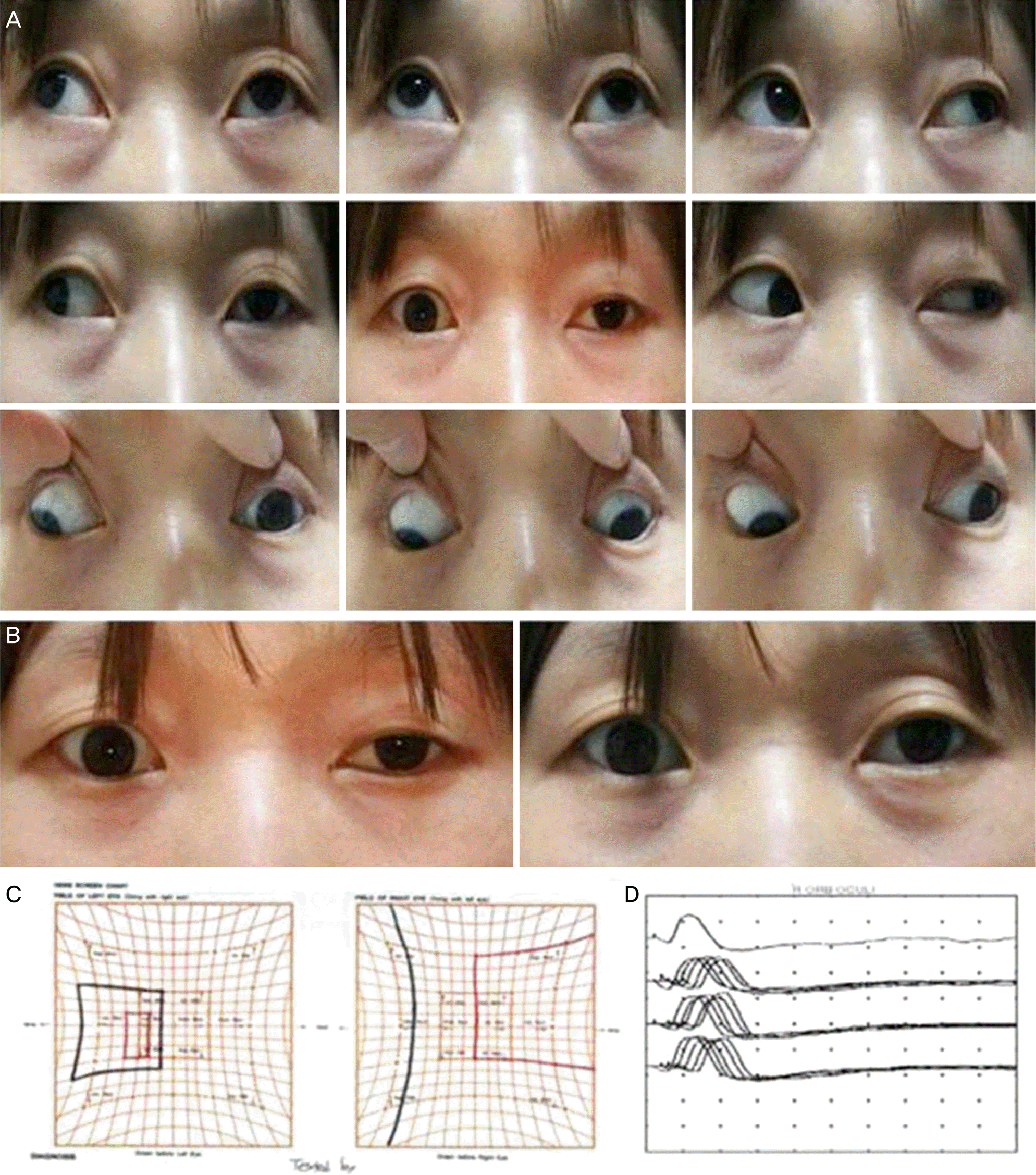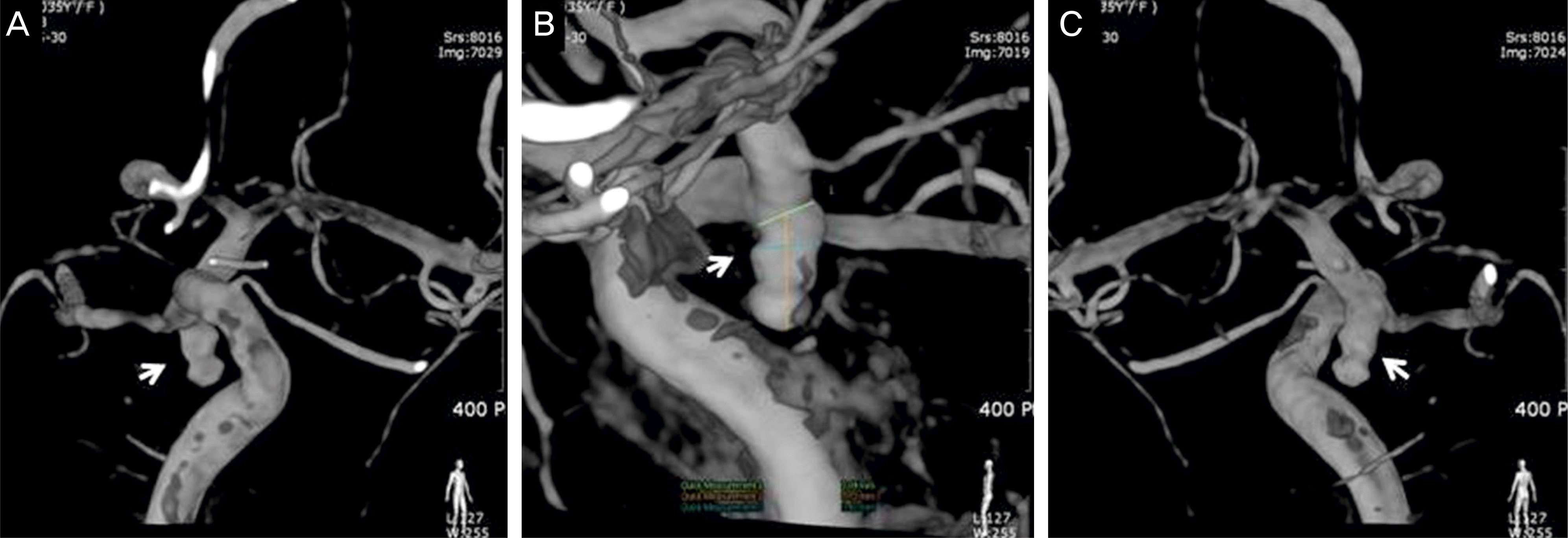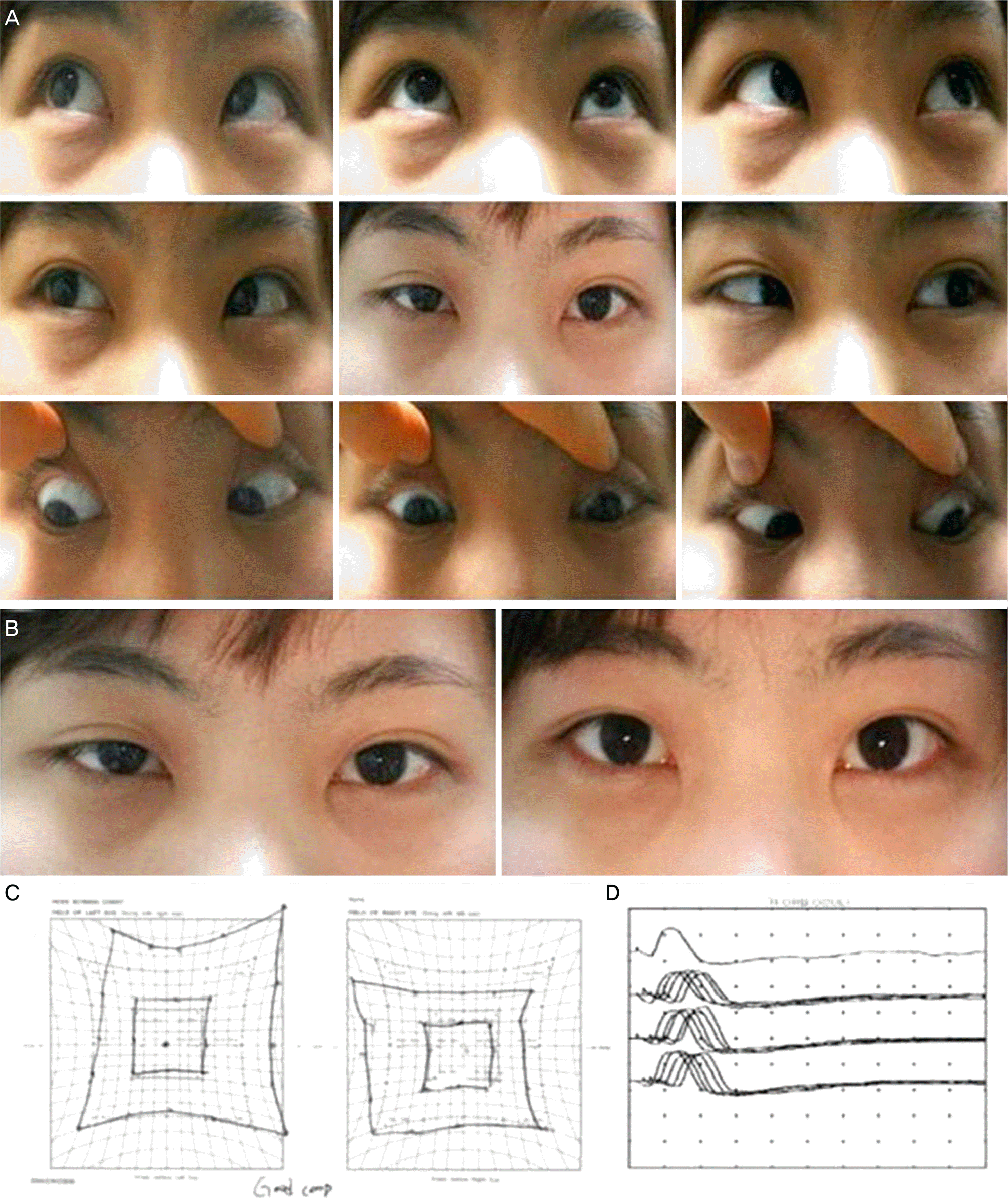Abstract
Purpose
To report two patients with positive ice tests who had diplopia and blepharoptosis caused by something other than ocular myasthenia gravis.
Case summary
A 35-year-old female presented with a one-week history of inability to adduct the left eye and left blepharoptosis. Although the ice test was positive, serum anti-acetylcholine receptor binding antibody and the repetitive nerve stimulation test were negative. Brain angiography showed an aneurysm of the left posterior communicating artery, leading to the diagnosis of left pupil-sparing oculomotor nerve palsy. A 25-year-old female presented with an 8-month history of intermittent horizontal diplopia and blepharoptosis in the right eye. The ice test was positive, however serum anti-acetylcholine receptor binding antibody and the repetitive nerve stimulation test were negative. Anti-nuclear antibody was positive (titer 1:160).
Go to : 
References
3. Benatar M. A systematic review of diagnostic studies in myasthenia gravis. Neuromuscul Disord. 2006; 16:459–67.

4. Golnik KC, Pena R, Lee AG, Eggenberger ER. An ice test for the diagnosis of myasthenia gravis. Ophthalmology. 1999; 106:1282–6.

5. Fakiri MO, Tavy DL, Hama-Amin AD, Wirtz PW. Accuracy of the ice test in the diagnosis of myasthenia gravis in patients with ptosis. Muscle Nerve. 2013; 48:902–4.

6. Chatzistefanou KI, Kouris T, Iliakis E. . The ice pack test in the differential diagnosis of myasthenic diplopia. Ophthalmology. 2009; 116:2236–43.

7. Vincent A, Newsom-Davis J. Acetylcholine receptor antibody as a diagnostic test for myasthenia gravis: results in 153 validated cases and 2967 diagnostic assays. J Neurol Neurosurg Psychiatry. 1985; 48:1246–52.

8. Hong YH, Kwon SB, Kim BJ. . Prognosis of ocular myasthenia in Korea: a retrospective multicenter analysis of 202 patients. J Neurol Sci. 2008; 273:10–4.

9. Costa J, Evangelista T, Conceição I, de Carvalho M. Repetitive nerve stimulation in myasthenia gravis--relative sensitivity of different muscles. Clin Neurophysiol. 2004; 115:2776–82.

10. Hwang SJ, Lee TS, Park BW. The usefulness of ice test for diagnosis of myasthenia gravis in patients with ptosis. J Korean Ophthalmol Soc. 2005; 46:1611–7.
11. Ellis FD, Hoyt CS, Ellis FJ. . Extraocular muscle responses to orbital cooling (ice test) for ocular myasthenia gravis diagnosis. J AAPOS. 2000; 4:271–81.

12. Borenstein S, Desmedt JE. Temperature and weather correlates of myasthenic fatigue. Lancet. 1974; 2:63–6.

13. Saavedra J, Femminini R, Kochen S, deZarate JC. A cold test for myasthenia gravis. Neurology. 1979; 29:1075.

14. Reiner E, Buntić A, Trdak M, Simeon V. Effect of temperature on the activity of human blood cholinesterases. Arch Toxicol. 1974; 32:347–50.
15. Alaraj AM, Oystreck DT, Bosley TM. Variable ptosis after botulinum toxin type a injection with positive ice test mimicking ocular myasthenia gravis. J Neuroophthalmol. 2013; 33:169–71.

16. Agmon-Levin N, Damoiseaux J, Kallenberg C. . International recommendations for the assessment of autoantibodies to cellular antigens referred to as anti-nuclear antibodies. Ann Rheum Dis. 2014; 73:17–23.

17. Appenzeller S, Veilleux M, Clarke A. Third cranial nerve palsy or pseudo 3rd nerve palsy of myasthenia gravis? A challenging diagnosis in systemic lupus erythematosus. Lupus. 2009; 18:836–40.

18. Koch M, Langmann A. Diplopia as the presenting sign of systemic lupus erythematosus: the chameleon diagnosis. J AAPOS. 2006; 10:184–5.

19. Sthoeger Z, Neiman A, Elbirt D. . High prevalence of systemic lupus erythematosus in 78 myasthenia gravis patients: a clinical and serologic study. Am J Med Sci. 2006; 331:4–9.

20. Tummala RP, Harrison A, Madison MT, Nussbaum ES. Pseudo- myasthenia resulting from a posterior carotid artery wall aneur-ysm: a novel presentation: case report. Neurosurgery. 2001; 49:1466–8. discussion 1468-9.
21. Mindel JS, Charney JZ. Bilateral intracavernous carotid aneurysms presenting as pseudo-ocular myasthenia gravis. Trans Am Ophthalmol Soc. 1989; 87:445–57. discussion 457-62.
Go to : 
 | Figure 1.(A) Nine-cardinal gaze photographs of case I showing left blepharoptosis and severe limitation on adduction, infraduction, and moderate limitation on supraduction of the left eye. (B) Photographs showing improvement of left blepharoptosis following application of the ice pack: before (left column) and after applying ice pack for 2 minutes (right column). (C) Hess screen chart revealing left oculomotor nerve palsy. (D) Repetitive nerve stimulation test showing normal response of the orbicularis oculi. |
 | Figure 2.(A) Oblique anterior, (B) lateral (magnified), (C) oblique posterior three-dimension reconstructed digital subtraction an-giography showing a 5.7 × 3.0 × 3.4-cm-sized saccular aneurysm on the left posterior communicating artery (indicated by white arrows). |
 | Figure 3.(A) Nine-cardinal gaze photographs of case II one week after the initial visit showing right blepharoptosis and slight limitation on supraduction of the right eye. (B) Photographs showing improvement of right blepharoptosis following application of the ice pack: before (left column) and after applying ice pack for 2 minutes (right column). (C) Hess screen chart revealing underaction of the right superior rectus. (D) Repetitive nerve stimulation test showing normal response of the orbicularis oculi. |




 PDF
PDF ePub
ePub Citation
Citation Print
Print


 XML Download
XML Download